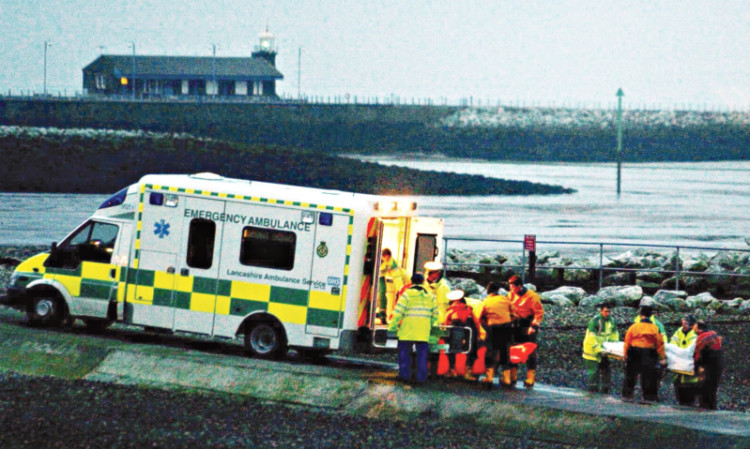
Illegal cocklers will continue to pour on to Britain’s shorelines in a bid to get rich quick, it has been warned.
Next month marks the 10th anniversary of the Morecambe Bay tragedy, when unpredictable tides killed 23 Chinese cockle pickers.
Despite a nationwide outcry and vows from authorities that such a catastrophe must be prevented from happening again, those who know the bay best fear the risk is as real as ever.
The beds are currently closed but numerous attempts by illegal cocklers have been made over the past decade to harvest the cockles, worth up to £1,200 a tonne.
Prior to the tragedy in 2004, Lancaster City Councillor Keith Budden, who represents Bolton-le-Sands, which is on the Bay, issued warnings that cockler deaths are inevitable unless the authorities take action. He claims little has changed.
“It is easy money for anyone who needs it. People with no knowledge of Morecambe Bay kept turning up here to cockle days, months and years after the tragedy. It shocked me then given that they must have known what had happened here.
“And 10 years on, it will make even less of a difference. There has been little regulation so far but, realistically, a coastline cannot be patrolled 24 hours a day it will continue to be a problem.”
Cedric Robinson MBE, the Queen’s Guide to the Sands, claimed the poor state of the economy is driving people to risk their lives.
He said: “You would have thought people would have learned a lesson, but it comes down to money. These days there are so many people out of work. Earning money from cockling could be a lifeline and so they will still come when the beds open. Regulation and licences won’t stop them. They only care about money. We have already had lots of near misses.”
One of the most serious incidents occurred in 2011 when illegal cocklers returned to the beds that were shut during the night. Fishermen alerted fisheries officials who were sent to investigate. Bags of harvested cockles concealed at the edge of a marsh near Humphrey Head were found, and four Polish fishermen were also found on the shore with cockle harvesting equipment.
But Morecambe Bay is not the only stretch where amateur cocklers have risked their lives in the hope of a bumper payday.
In October 2011 17 cockle pickers had to be rescued from the sea when up to 400 amateur cocklers, many from Eastern Europe, descended on Lytham St Annes on the Ribble Estuary when the beds opened for the first time in two decades.
It was among scores of incidents which happened within six weeks of the beds opening as workers battled to earn up to £1,000 a day.
And, in 2012, there were fears another human tragedy was around the corner as scores of illegal cockle gangs operated on the shores of the Solway Firth.
In the wake of the tragedy the Gangmasters Licensing Authority (GLA) was established to protect workers from exploitation by forcing businesses or individuals wanting to act as a gangmaster to be licensed.
But now, with the Morecambe Bay anniversary just weeks away, the TUC trade union has claimed cocklers are now at a heightened risk of exploitation after the Government stopped the GLA carrying out automatic inspections on people applying for gangmaster licences last October.
TUC general secretary Frances O’Grady, said: “10 years ago the tragedy in Morecambe Bay led to the creation of the Gangmasters Licensing Authority, which made it harder for employers to force people to work in dangerous, unsupervised conditions for a pittance.
“Since then the GLA has successfully taken enforcement action against numerous unscrupulous bosses who were exploiting vulnerable migrant workers, and forced them to pay a legal wage and house workers in decent accommodation.
“Yet, when human trafficking and forced labour are on the increase, the Government has decided that now is a good time to limit the remit of the GLA.
“Ministers have encouraged the GLA to move away from automatic inspections for firms applying for a licence, making migrant workers employed in high-risk sectors more vulnerable to abuse and exploitation.”
A spokesman for the Department of Environment, Food and Rural Affairs, said: “The Gangmasters Licensing Authority protects workers from exploitation by taking an intelligence-led approach.
“This has allowed it to focus its attentions on apprehending the criminal gangs responsible for exploitation, human trafficking and forced labour.”
How the tragedy unfolded
A lifeboat crew member leaving a gym, which overlooks Morecambe Bay, sounded the alarm after seeing what he thought was a group of people trapped on a sandbank at 9.15pm on February 5, 2004. Emergency crews were scrambled but their rescue efforts were hampered by darkness, 30mph winds and two-metre high waves.
The first body was found in the water at 3am. Searchers realised they were dealing with a major disaster when a lifeboat came across eight bodies together in the water. And, in the following hours, body after body was pulled from the water.
The last victim was found at 3.30pm the following day, taking the death toll to 21. Eight survivors were found and taken to the Royal Lancaster Infirmary.
Another body was washed up in 2010. The body of the other missing Chinese national has never been found.
Gangmaster Lin Lian Ren, who sent his employees out on to the dangerous sands in the dark and cold to scour the area for cockles, which he then sold to restaurants, was jailed for 14 years for his part in the tragedy. He was convicted of 21 counts of manslaughter after a seven-month trial at Preston Crown Court in 2005.

Enjoy the convenience of having The Sunday Post delivered as a digital ePaper straight to your smartphone, tablet or computer.
Subscribe for only £5.49 a month and enjoy all the benefits of the printed paper as a digital replica.
Subscribe